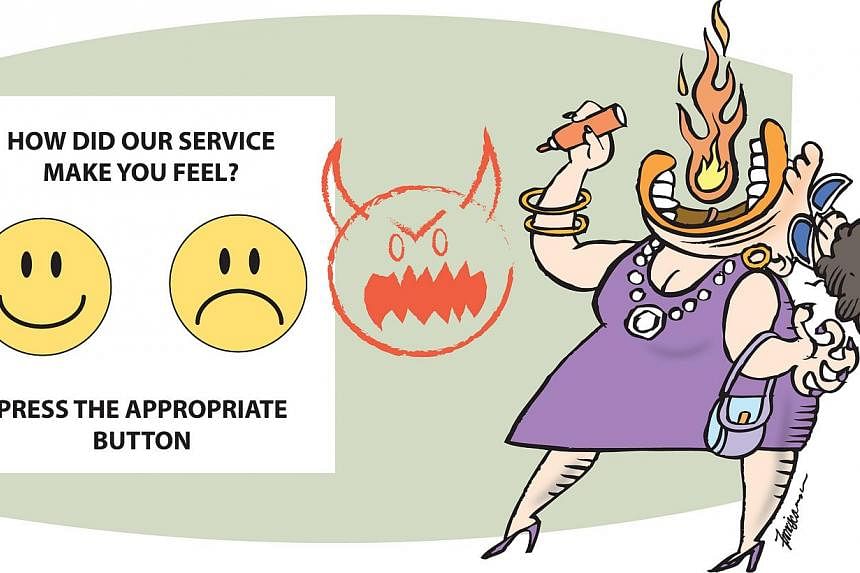LATE last month in his May Day message, labour chief Lim Swee Say called for a nation of better customers.
Overly demanding customers would cause even more of a strain on the labour crunch, he said.
My first reaction, like many others, was to turn defensive. I could be a better customer if I got better service, I thought.
Particularly stinging were his words: "Instead of complaining that the service standard in Singapore is still not good enough, why don't you ask yourself, 'Are the customers in Singapore good enough?'"
Comparisons between service standards here and those overseas invariably arise. A friend recounted to me his experience in Japan. He arrived at a restaurant that was full, and the owner kept bowing and apologising. In Singapore, he said, we are often left in the queue to wait our turn.
Here, I've entered shops and been ignored by staff who would rather stare at their mobile phones. Getting a friendly waiter at a restaurant seems more of the exception rather than the norm.
But perhaps we should look inwards and ask ourselves: Do we deserve the service that we get?
An article by my colleague Kezia Toh in Life! two Sundays ago highlighted some examples of bad customers.
Customers who swear and call service staff "stupid", get them to run errands and threaten to get them sacked are "all in a day's work for employees in the service industry", she wrote.
A trainee waiter at a restaurant recounted to me how a group of Singaporeans sarcastically asked him if he had to catch the fish himself, after he explained that the food would take longer to arrive because there were not enough staff.
Four other tables soon joined in the taunting and vented their frustrations on the waiter, an 18-year-old wearing a badge that stated "trainee".
We have an old mindset that looks down on people who serve, said Dr William Wan, general secretary of the Singapore Kindness Movement. "It is a 'demand' culture where we think money can buy everything, including good service."
Dr Guan Chong, a marketing lecturer at SIM University's School of Business noted that Singaporeans, being well-travelled, expect the same standard of service here as in other countries.
According to the Nielsen Global Survey of Consumer Confidence and Spending Intentions last year, Singaporean consumers recorded the highest level of intention globally to spend their money on holidays and vacations (49 per cent). This works out to almost one in two Singaporeans.
"South-east Asian countries like Indonesia and Thailand are common travel destinations, which shapes the comparison benchmark and service expectation," Dr Guan noted.
"However, in these countries, the high service standard is supported by an ample and affordable domestic service workforce."
Social media also helps consumers become better informed. They develop savvy buying habits as well as higher expectations, she said.
Consumers also feel more empowered, knowing that they can voice their opinion of a service provider online and that their words can actually influence their peers, she added.
The reason we behave the way we do, however, does not excuse our bad behaviour.
To be a good customer, we should respond to the level of service given, said Mr Seah Seng Choon, executive director of the Consumers Association of Singapore. "If the customer was served well, give a compliment. If there are lapses, give suggestions on how to improve," he said.
The problem is that most customers do not find a balance between the two, he noted. They are quick to complain, but are less prompt to give credit where it is due.
"Compliments will motivate staff to do better and feedback can help them improve on how things are done," Mr Seah said.
The Singapore Kindness Movement's Dr Wan said: "We can bridge the gap by taking notice of people who render services to us. They are not invisible. They have names and aspirations and dreams. Wish them by name and thank them by name."
But the perception that customers here are overly demanding may not reflect the actual situation, said Ms Caroline Lim, director of the Institute of Service Excellence at the Singapore Management University. Bad experiences are more vivid, and tend to stick in our minds, she said.
Furthermore, our behaviour may be a result of the quick service here. "We may get our orders to the waiters using the fewest number of words, without exchanging pleasantries, unlike in the United States where servers and customers engage in small talk," said Ms Lim.
The problem is that there is no established norm of how customers should behave in Singapore, she said.
We tend to pick up cues on how to act in an environment depending on how others act, she said. This explains why a Singaporean who does not return his food tray in a fast-food outlet here does so in other countries where it is the norm.
There needs to be more discussion about establishing what is normal here, Ms Lim said.
"When I go to Thailand, people will greet me with 'Sawadeeka'. When I go to Japan, I will get attention down to the last detail. We haven't created something unique for Singapore," she said.
"When we see a fellow customer being rude and unreasonable, do we speak up? Will owners stand up and be intolerant of such customers?" said Ms Lim.
It is only when we take a stand on what is acceptable and unacceptable customer behaviour here that the situation in Singapore will change.
So before we complain about the problems with Singapore's service industry, perhaps we should think about how we can be a part of the solution.


